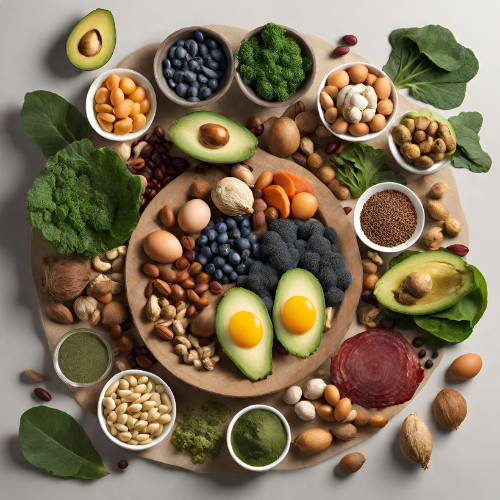15 Foods Rich in Minerals

Minerals are the unsung heroes of our diet, playing crucial roles in maintaining overall health and well-being. These essential nutrients are vital for various bodily functions, from building strong bones and teeth to supporting metabolism and immune function. While we often focus on vitamins, minerals are equally important for our health and vitality.
In this blog, we’ll delve into the world of minerals and explore 15 nutrient-rich foods that can help you meet your daily mineral needs. From nuts and seeds to leafy greens and shellfish, these foods are not only delicious but also packed with essential minerals that your body craves.
1. Nuts and Seeds:
Nuts and seeds are nutritional powerhouses, rich in minerals like magnesium, zinc, and selenium. Magnesium plays a crucial role in muscle and nerve function, while zinc supports immune health and wound healing. Including a variety of nuts and seeds, such as almonds, walnuts, chia seeds, and flaxseeds, in your diet can help you meet your mineral needs while enjoying tasty snacks or adding crunch to your meals.
2. Shellfish:
Shellfish, including oysters, clams, and shrimp, are excellent sources of minerals like iron, zinc, and copper. Iron is essential for transporting oxygen throughout the body, while zinc and copper are involved in immune function and energy metabolism. Incorporating shellfish into your diet can provide a nutrient boost while adding a delicious seafood flavour to your meals.
3. Cruciferous Vegetables:
Cruciferous vegetables like broccoli, cauliflower, and kale are not only rich in vitamins but also packed with minerals such as calcium, potassium, and manganese. Calcium is vital for strong bones and teeth, while potassium helps regulate blood pressure and muscle function. Manganese acts as a cofactor for various enzymes involved in metabolism and antioxidant defence. Including cruciferous vegetables in your meals can help you maintain optimal mineral levels while enjoying their crunchy texture and vibrant flavours.
4. Organ Meats:
Organ meats, such as liver and kidneys, are nutrient-dense foods that are exceptionally rich in minerals like iron, zinc, and selenium. Iron is crucial for red blood cell production, while zinc supports immune function and wound healing. Selenium acts as a powerful antioxidant, protecting cells from damage caused by free radicals. Incorporating small amounts of organ meats into your diet can provide a concentrated source of essential minerals to support overall health.
5. Eggs:
Eggs are a versatile and affordable source of essential minerals, including iron, phosphorus, and selenium. Iron is necessary for transporting oxygen in the blood, while phosphorus is vital for bone health and energy metabolism. Selenium plays a key role in thyroid function and immune health. Adding eggs to your diet can provide a nutrient boost while offering a convenient and delicious meal option.
6. Beans:
Beans, such as black beans, chickpeas, and lentils, are nutrient-rich foods that are loaded with minerals like magnesium, potassium, and zinc. Magnesium plays a crucial role in muscle and nerve function, while potassium helps regulate blood pressure and fluid balance. Zinc supports immune function and wound healing. Including beans in your diet can help you meet your daily mineral needs while providing a good source of plant-based protein and fiber.
7. Cocoa:
Cocoa is not only a decadent treat but also a rich source of minerals like iron, magnesium, and manganese. Iron is essential for red blood cell production, while magnesium supports muscle and nerve function. Manganese acts as a cofactor for various enzymes involved in metabolism and antioxidant defence. Enjoying dark chocolate or cocoa powder in moderation can provide a flavourful way to boost your mineral intake while indulging your sweet tooth.
8. Avocados:
Avocados are nutrient-dense fruits that are packed with minerals like potassium, magnesium, and copper. Potassium plays a crucial role in regulating blood pressure and fluid balance, while magnesium supports muscle and nerve function. Copper is involved in energy metabolism and antioxidant defence. Adding avocados to your diet can provide a creamy and delicious source of essential minerals while offering heart-healthy monounsaturated fats.
9. Berries:
Berries, such as strawberries, blueberries, and raspberries, are not only delicious but also rich in minerals like potassium, manganese, and vitamin C. Potassium helps regulate blood pressure and fluid balance, while manganese acts as a cofactor for various enzymes involved in metabolism and antioxidant defence. Vitamin C supports immune function and collagen production. Including berries in your diet can add a burst of flavour and provide a nutrient boost to support overall health.
10. Sardines:
Sardines are small, oily fish that are packed with minerals like calcium, phosphorus, and selenium. Calcium is essential for strong bones and teeth, while phosphorus plays a key role in energy metabolism and bone health. Selenium acts as a powerful antioxidant, protecting cells from damage caused by free radicals. Incorporating sardines into your diet can provide a flavourful and nutrient-rich source of essential minerals and omega-3 fatty acids.
11. Spirulina:
Spirulina is a nutrient-rich algae that is packed with minerals like iron, calcium, and magnesium. Iron is essential for red blood cell production, while calcium is vital for bone health and muscle function. Magnesium plays a crucial role in nerve and muscle function, as well as energy metabolism. Adding spiralling powder to smoothies or incorporating it into recipes can provide a concentrated source of essential minerals to support overall health.
12. Ancient Grains:
Ancient grains, such as quinoa, amaranth, and farro, are nutrient-dense foods that are rich in minerals like magnesium, phosphorus, and zinc. Magnesium plays a crucial role in muscle and nerve function, while phosphorus is essential for bone health and energy metabolism. Zinc supports immune function and wound healing. Including ancient grains in your diet can provide a flavourful and nutritious alternative to refined grains while offering a good source of essential minerals.
13. Starchy Vegetables:
Starchy vegetables like sweet potatoes, potatoes, and squash are not only satisfying and delicious but also rich in minerals like potassium, manganese, and vitamin C. Potassium helps regulate blood pressure and fluid balance, while manganese acts as a cofactor for various enzymes involved in metabolism and antioxidant defense. Vitamin C supports immune function and collagen production. Including starchy vegetables in your meals can add texture and flavour while providing a nutrient boost to support overall health.
14. Tropical Fruits:
Tropical fruits, such as bananas, mangoes, and papayas, are not only exotic and flavourful but also rich in minerals like potassium, magnesium, and vitamin C. Potassium plays a crucial role in regulating blood pressure and fluid balance, while magnesium supports muscle and nerve function. Vitamin C supports immune function and collagen production. Enjoying tropical fruits as part of your diet can add a burst of sweetness and provide essential minerals to support overall health.
15. Leafy Greens:
Leafy greens, such as spinach, kale, and Swiss chard, are nutritional powerhouses that are packed with minerals like calcium, magnesium, and iron. Calcium is essential for strong bones and teeth, while magnesium plays a crucial role in muscle and nerve function. Iron is necessary for red blood cell production and oxygen transport. Including leafy greens in your diet can provide a nutrient boost while offering a versatile and flavourful addition to salads, soups, and stir-fries.
In conclusion, incorporating a variety of mineral-rich foods into your diet is essential for maintaining optimal health and well-being. From nuts and seeds to leafy greens and shellfish, these nutrient-dense foods can help you meet your daily mineral needs while enjoying delicious and satisfying meals. So why not start exploring the world of mineral-rich foods today and nourish your body from the inside out?
Remember, small changes in your diet can lead to big benefits for your health in the long run. So, don’t be afraid to experiment with new foods and flavors, and enjoy the journey to a healthier, more vibrant you!
for more Healthy blogs CLICKHERE
